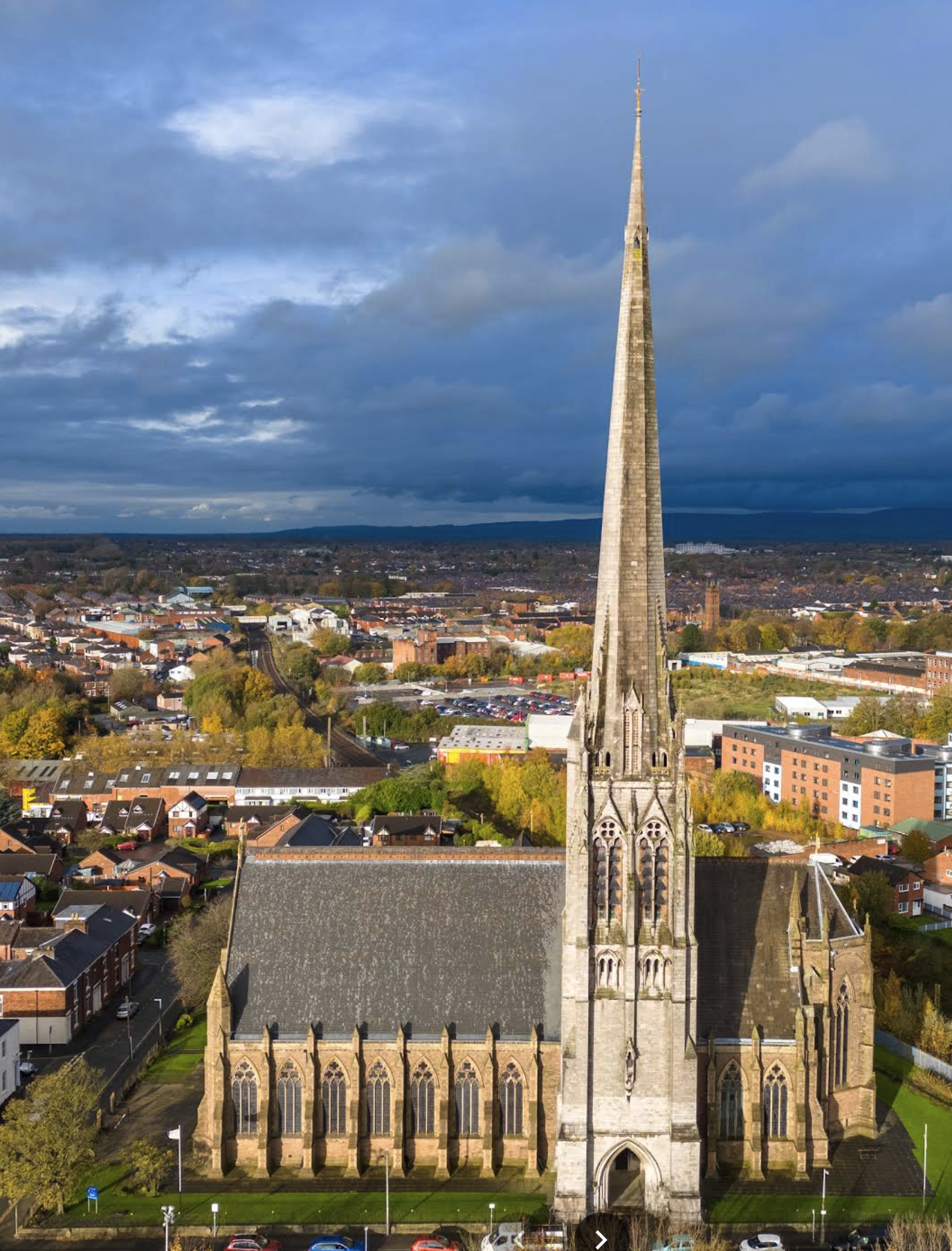Brief to Evaluation Consultant
• Duration: October 2025 to June 2026
• Working time: Approx 15 days.
• Fee: £3,000
The Role
Having secured a National Lottery Heritage Fund grant for urgent roof repairs and a wide ranging activity plan, the Church of St Walburge is seeking an Evaluation Consultant to support its reporting to the funder and its learning for future activity development.
The total project cost is £647,000, of which approximately £80,000 is for activity. The NLHF grant is £247,000.
Background

The Church of St. Walburge in Preston is one of the most important mid-19th century churches in Britain and is Listed Grade I. The building was designed by Joseph Hansom and is famous for having the tallest spire of any Parish Church in England. The church is in the Maudlands district of Preston; so called because of its association with St. Mary Magdalene. This dates back to a C12th leprosy hospital dedicated to the Saint which then occupied the site.
In 1847, the architect Joseph Hansom was commissioned to build a large church and work began on construction in May 1850. It was ready for its opening ceremony by August 1854. The church was further extended in 1873 by the addition of a polygonal sanctuary, the central window of which is 11 metres high. Externally St Walburge’s spire, rising to 309 feet (94 m), is the dominant landmark in Preston and is one of the tallest structures of any sort in Lancashire. It is immediately recognisable, not just within the city but also from outside, and, after Salisbury and Norwich Cathedrals it is the third tallest spire in the UK. The steeple is reputedly constructed from limestone sleepers which originally carried the nearby Preston and Longridge Railway. Beneath the spire the tower bell chamber contains a single bell of 1.5 tonnes, which is the heaviest swinging bell in Lancashire.
The spire is home to a pair of peregrine falcons who return each summer to raise their young. This restricts use of the bell and access to the tower to the public. The tower is usually opened twice a year for public tours. There is an amazing view from the top.
Since 2014 the church has been in the care of the Institute of Christ the King Sovereign Priest (ICKSP), an Order of priests whose Mother House is in Italy and who serve 5 British churches, mostly in the north west. St Walburge’s has the status of a shrine church, rather than a parish. ICKSP is a Latin Mass community and within this tradition Masses and offices are sung in Gregorian chant – unique outside a monastic setting. There are services every day, with 3 of Sundays. The congregation numbers about 300 and is growing.
The church has an extensive archive numbering at least 5000 items which dates back to its foundation. It consists of correspondence, architect’s drawings and plans, photographs and a complete set of parish weekly news bulletins. The collection has never been fully explored.
All Under One Roof
All Under One Roof has 4 strands of work
- Re-roofing the south aisle to prevent water leaks and secure the church’s fabric.
- Sharing our History – a project to catalogue our archives and create and exhibition and website, in association with Lancashire Archives, UCLan history students, and volunteers.
- Sharing our Sacred Sounds – a project to preserve and share the unique sound of St. Walburge’s Choir by professionally recording core prayers of the Mass. These recordings, produced in partnership with the Global Sound Movement (GSM), will be contextualised through a podcast discussion featuring historical insights and reflections on the role of sacred music in the modern world and made available on open digital channels.
- Sharing skills – a series of 3x half day heritage conservation skills workshops produced by UCLan School of Engineering and the main roofing contractor. Participants will include students and members of the public. One session will focus on the use of drones in surveying historic buildings and will include drone flights inside and outside the church. Other sessions will focus on specialised roofing and dry rot infestations.
We have the following project aims:
• To secure the future of our Grade 1 listed church by repairing and restoring the south roofs, preventing water ingress and further deterioration of the interior
• To understand and make accessible the contents of our extensive church archives so they can be used as a resource for the local community
• To preserve and share our unique liturgical heritage of Gregorian chant in partnership with University of Central Lancashire (UCLan) Global Sound Movement
• To share practical conservation skills with students and members of the public via workshops with UCLan School of Engineering and our main roofing contractor, HCR
• To train volunteers in heritage research, cataloguing and communication skills
• To offer opportunities for community engagement to the large numbers of students living in our neighbourhood
• To be better understood by and more embedded in the Preston community
• To become more sustainable as an organisation.
The principal requirements are as follows;
• Prepare an evaluation framework for the project team to follow
• Deliver training in monitoring and evaluation principles and practical requirements for evaluation data collection in this project to the Sharing our History Project Coordinator and the volunteers (approx. 30)
• Liaise with Global Sound Movement (UCLan) on their evaluation methodology to ensure it is reflected in the framework
• Collect baseline data from volunteers re expectations
• Periodically monitor via the PM data on volunteer hours and productivity
• Periodically monitor with Global Sound Movement on metrics for Sharing our Sacred Sound
• Undertake questionnaire surveys for participants in skills workshops
• As volunteers and other participants (e.g. choir members) complete their input collect insights on their learning and experience via survey or interview
• Produce an evaluation report.
Our partners at University of Central Lancashire and Lancashire Archives have embedded evaluation protocols and will undertake monitoring and analysis as required by the framework. Additional support is available from the Project Team.
To apply
Please submit a short proposal demonstrating your methodology and your relevant experience in evaluation of NLHF funded projects by Monday 20th October 2025 to the project manager at


